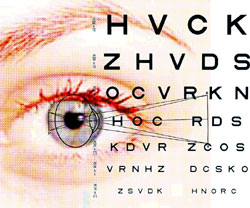
 |
Job CategoriesArticles |
The right vision
By Amitabh Sharma
 Vision is a gift of nature that bestows us with colours, hues, shades, light and darkness and the power to differentiate between each of them. The sense of sight brings countless joys, it is inconceivable to imagine a world surrounded in darkness. Vision is a gift of nature that bestows us with colours, hues, shades, light and darkness and the power to differentiate between each of them. The sense of sight brings countless joys, it is inconceivable to imagine a world surrounded in darkness.
Most of this can be attributed to lack of awareness, lack of resources, and above all the dearth of qualified professionals in the field of optometry. These professionals are a vital link for healthy eye care and are resulting in millions of people losing their vision needlessly. According to World Health Organisation (WHO) statistics, the minimum number of eye care professionals (for a population of 500,000) should be one ophthalmologist, four optometrists, eight eye care workers, eight ophthalmic assistants and 16 ophthalmic nurses to achieve the vision 2020 objective it has set. Optometry is a career in demand, and one that offers tremendous opportunities. What is Optometry? Optometry (Ophthalmic Optics) is a para-medical discipline, which deals with the structure, function and working of the human eyes and visual system. The World Council of Optometry (WCO) defines Optometry as a healthcare profession that is autonomous, educated and regulated (licensed/registered), and optometrists are the primary healthcare practitioners of the eye and visual system who provide comprehensive eye and vision care, which includes refraction and dispensing, detection/diagnosis and management of disease in the eye, and the rehabilitation of conditions of the visual system. The work of an optometrist includes examination of the eyes for the estimation of refractive errors. An optometrist is also responsible for fitting spectacles, contact lenses and other optical aids. He is required to examine the eyes and the visual system, diagnose the visual problem, prescribe and provide remedial, corrective treatment. The work of an optometrist is to cater to general problems. If you see the number of people wearing spectacles, you can get an idea of the volume of work for these professionals. If any pathological condition is detected during the examination, the optometrist immediately refers the patient to an Ophthalmologist (ophthalmic surgeon) for medical therapy and/or surgical correction. Optometric practice does not only include the determination of the refractive status of the eyes, prescribing and dispensing of glasses, it has a wider scope than that. With the advance of technology and newer products being introduced in quick succession, an optometrist is also required to upgrade his knowledge continuously. For an optometrist to be a thorough professional, his optometric education through the proper channels is very important. Why do we need Optometrists? Optometrists offer the first level of eye care. They are the primary eye care professionals. They perform the investigative part – visual screening, examine the eyes for various refractive conditions, provide and prescribe remedial, corrective treatment in the form of visual aids and vision therapy. The role of the optometrist, as the first level of investigation for refractive errors- one of the leading preventable causes of blindness- makes him or her indispensable to the overall eye care set up. Apart from that, optometrists, because of their sheer outreach in the communities are ideally placed to detect & rectify refractive errors. Optometry as a career Optometry as a career offers fabulous opportunities, but before you can begin to fix people’s eyes, you have to undergo formal training in the field of eye care. As an optometrist, you can begin your career by working in an optical outlet or in an ophthalmologic clinic. Working with someone will help build your confidence by giving you the necessary exposure and experience. Should you not want to work with someone, you can always begin your own optical outlet, there is a huge demand for optometrists out there, and you can have your own outlet. The amount you earn as an optometrist can vary according to where you work, the nature of your job and past experience. If you have your own outlet, your earnings can be much more than that, depending on how the outlet does. Optometry is not just associated with studying the subject and spending the rest of your life dispensing refractive prescriptions to people. The job profile of an optometrist can range from checking peoples eye for refractive errors, to teaching the subject, researching on vision care and even starting an optical business. Optometry as we know it is very generic. This is divided into so many fields and specialistions, which offer wide variety of options for the optometrist. What do optometrists do?
amitabh.sharma@gleanerjm.com |
|
© Copyright Jamaica Gleaner
|